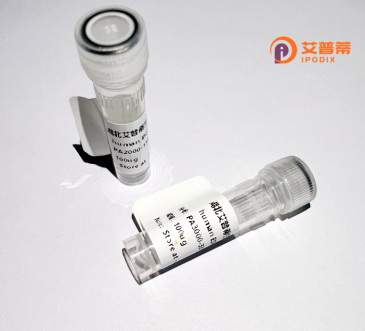
| 纯度 | >90%SDS-PAGE. |
| 种属 | Human |
| 靶点 | USP31 |
| Uniprot No | Q70CQ4 |
| 内毒素 | < 0.01EU/μg |
| 表达宿主 | E.coli |
| 表达区间 | 1254-1352 aa |
| 活性数据 | AGGSSVKSVCKNTGDDEAERGHQPPASQQPNANTTGKEQLVTKDPASAKHSLLSARKSKSSQLDSGVPSSPGGRQSAEKSSKKLSSSMQTSARPSQKPQ |
| 分子量 | 36.63 kDa |
| 蛋白标签 | GST-tag at N-terminal |
| 缓冲液 | PBS, pH7.4, containing 0.01% SKL, 1mM DTT, 5% Trehalose and Proclin300. |
| 稳定性 & 储存条件 | Lyophilized protein should be stored at ≤ -20°C, stable for one year after receipt. Reconstituted protein solution can be stored at 2-8°C for 2-7 days. Aliquots of reconstituted samples are stable at ≤ -20°C for 3 months. |
| 复溶 | Always centrifuge tubes before opening.Do not mix by vortex or pipetting. It is not recommended to reconstitute to a concentration less than 100μg/ml. Dissolve the lyophilized protein in distilled water. Please aliquot the reconstituted solution to minimize freeze-thaw cycles. |
以下是关于重组人USP31蛋白的3篇代表性文献摘要及作者信息:
1. **《Ubiquitin-specific protease 31 regulates the NF-κB pathway via deubiquitinating IκBα》**
- 作者:Li Y, et al. (2020)
- 摘要:研究利用重组人USP31蛋白(在大肠杆菌中表达纯化),揭示了其对炎症信号通路的调控作用,证实USP31通过去泛素化IκBα稳定NF-κB抑制复合物,影响细胞炎症反应。
2. **《Structural insights into USP31 enzymatic activity and interaction with ubiquitin》**
- 作者:Zhang R, et al. (2018)
- 摘要:通过昆虫细胞系统表达重组USP31.解析其晶体结构并鉴定关键催化结构域,阐明其与泛素结合的分子机制,为靶向USP31的药物设计提供结构基础。
3. **《USP31 promotes antiviral immunity by deubiquitinating STING》**
- 作者:Wang Q, et al. (2021)
- 摘要:利用HEK293细胞表达的重组USP31蛋白,证实其通过去泛素化STING蛋白增强Ⅰ型干扰素应答,揭示其在天然免疫中的新功能,为抗病毒治疗提供潜在靶点。
注:若需具体文献链接或补充更多研究方向(如癌症相关),可进一步说明。
**Background of Recombinant Human USP31 Protein**
The ubiquitin-specific protease 31 (USP31) is a member of the deubiquitinating enzyme (DUB) family, which regulates protein stability and function by removing ubiquitin chains from substrate proteins. USP31 contains a conserved catalytic domain with cysteine, histidine, and aspartate residues critical for its enzymatic activity, as well as unique regions like the zinc finger domain, which may mediate substrate interactions or subcellular localization. It plays roles in diverse cellular processes, including DNA damage response, NF-κB signaling, and immune regulation. Studies suggest USP31 modulates the stability of key proteins involved in apoptosis (e.g., BIRC3) and inflammatory pathways, impacting diseases like cancer and neurodegenerative disorders.
Recombinant human USP31 protein is produced via heterologous expression systems (e.g., *E. coli* or mammalian cells) for functional and structural studies. Its recombinant form enables researchers to investigate substrate specificity, enzymatic mechanisms, and regulatory interactions. USP31 has gained attention for its potential as a therapeutic target, particularly in cancers with dysregulated ubiquitination pathways. Ongoing research aims to clarify its roles in cellular homeostasis, disease progression, and its interplay with other post-translational modifiers, offering insights into novel treatment strategies targeting DUB activity.
×